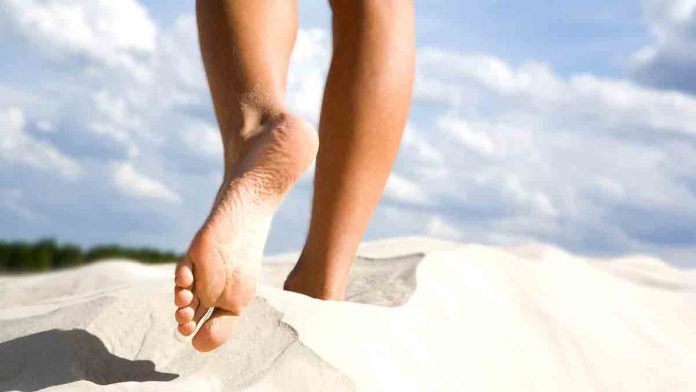
Scientists estimate that there are 72,000 nerve endings in the feet, so the feet are naturally massaged when walking barefoot. Massage has a positive effect, even on the work of internal organs. Walking barefoot not only hardens but also strengthens.
Walking barefoot could be called a kind of luxury of modern life. We are easily “imprisoned” in shoes from the first steps, our feet gradually adapt to such conditions, and we usually walk barefoot only a few days a year, resting by the sea or lakes.
Foot treatment first mentioned in 1900 by American physician William Fitzgerald.
It was known to him that the natives of Central and North America had, since ancient times, treated various ailments by stimulating the active points of the body in the feet.
And who can stimulate them better than walking barefoot on various surfaces.
Today, medics, pharmacists, and supporters of natural medicine praise for walking barefoot.
Walking barefoot on different surfaces affects the nervous system’s areas in the feet, from which the impulses reach the vital organ and activate the immune system as a whole of the human body.
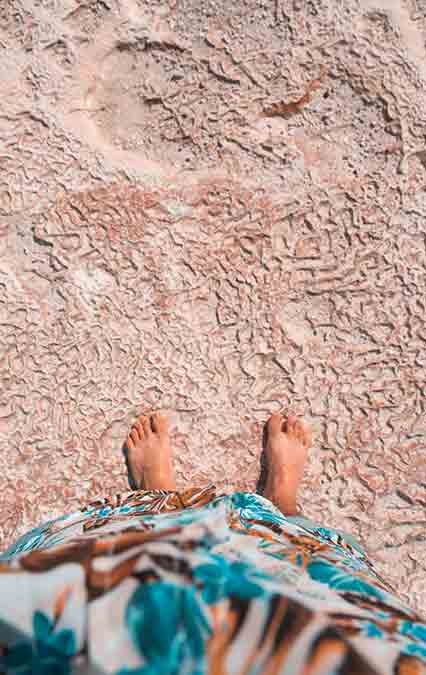
At the risk of colds, doctors advise not to forget to harden the body.
To protect against diseases, not only can you eat a lot of lemons, garlic, and other body-strengthening vegetables and fruits, doctors also offer to walk barefoot for at least 15 minutes every day.
People who catch a cold quickly and often must first start walking in a room with socks in the morning and evening for about half an hour.
This should be done daily by extending the walking time by ten minutes to an hour. Try doing it barefoot a few times.
Don’t be afraid of the cold weather. You can get out for a while, even in the yard.
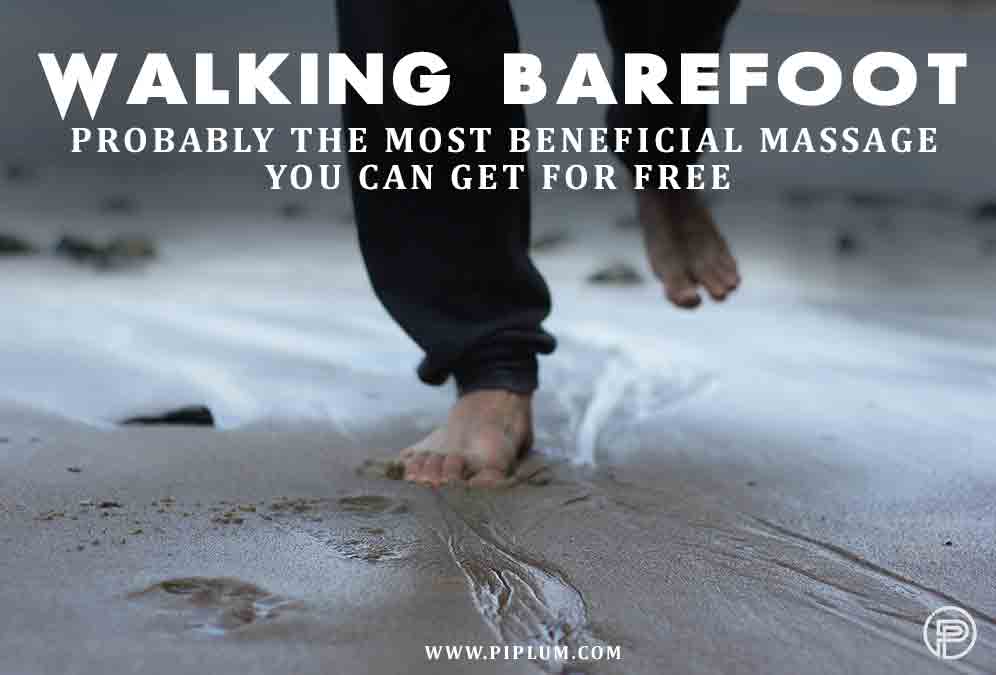
The Benefits of Walking Barefoot
Walking barefoot, also known as “earthing” or “grounding,” is a practice that involves walking without shoes or any other type of footwear. While it might seem unconventional in a world dominated by shoes, there are several potential advantages to walking barefoot that can contribute to your overall health and well-being.
- Improved Foot Strength and Function: Walking barefoot allows your feet to move naturally and engage muscles that might be underutilized when wearing shoes. This can lead to improved foot strength, better arch support, and enhanced overall foot function.
- Better Balance and Proprioception: Proprioception refers to your body’s ability to sense its position in space. Walking barefoot stimulates the nerve endings in your feet, which can enhance proprioception and help improve your balance and coordination.
- Enhanced Joint Health: Walking barefoot encourages a more natural gait and foot strike pattern. This can reduce the impact on your joints, potentially leading to decreased stress on the knees, hips, and lower back.
- Increased Sensory Stimulation: The soles of your feet are densely packed with nerve endings. Walking barefoot exposes these nerve endings to different textures and surfaces, providing a unique sensory experience that can stimulate your mind and body.
- Potential Pain Relief: Some individuals find relief from certain foot ailments, such as plantar fasciitis or bunions, by walking barefoot. This is due to the increased foot strength, better alignment, and reduced pressure on specific areas.
- Connection to Nature: Walking barefoot connects you more intimately with the earth beneath you. Some proponents of earthing believe that direct contact with the earth’s surface can help balance the body’s energy and reduce stress.
- Reduced Foot Odor and Fungal Infections: Going barefoot allows your feet to breathe, which can reduce the moisture buildup that often leads to foot odor and fungal infections like athlete’s foot.
- Cost-Effective and Convenient: Walking barefoot requires no equipment or special preparation. It’s a convenient and cost-effective way to enjoy the outdoors and experience its benefits.
- Mindfulness and Relaxation: Walking barefoot can encourage a sense of mindfulness and relaxation. Focusing on the sensations in your feet and the texture of the ground beneath you can be a meditative experience.
It’s important to note that while walking barefoot offers potential benefits, it might not be suitable for everyone. Individuals with certain foot conditions, sensitivity issues, or those who are at risk of injury due to the environment (such as sharp objects on the ground) should exercise caution. If you’re considering incorporating barefoot walking into your routine, start gradually and pay attention to how your body responds. As with any new fitness or health practice, it’s a good idea to consult with a medical professional if you have any concerns or pre-existing conditions.
You might like: Nordic Walking ABC. Super Healthy Fitness Trend From Scandinavia
The advantages of walking barefoot.
- such a natural massage relaxes the whole body
- eliminates fatigue
- eliminates irritability,
- eliminates insomnia,
- improves work capacity, memory, and attention
- positively affects the whole body
- improves blood and lymph circulation
- makes the limb joints more flexible
- relaxes tired feet
- makes the skin feel light, gentle.
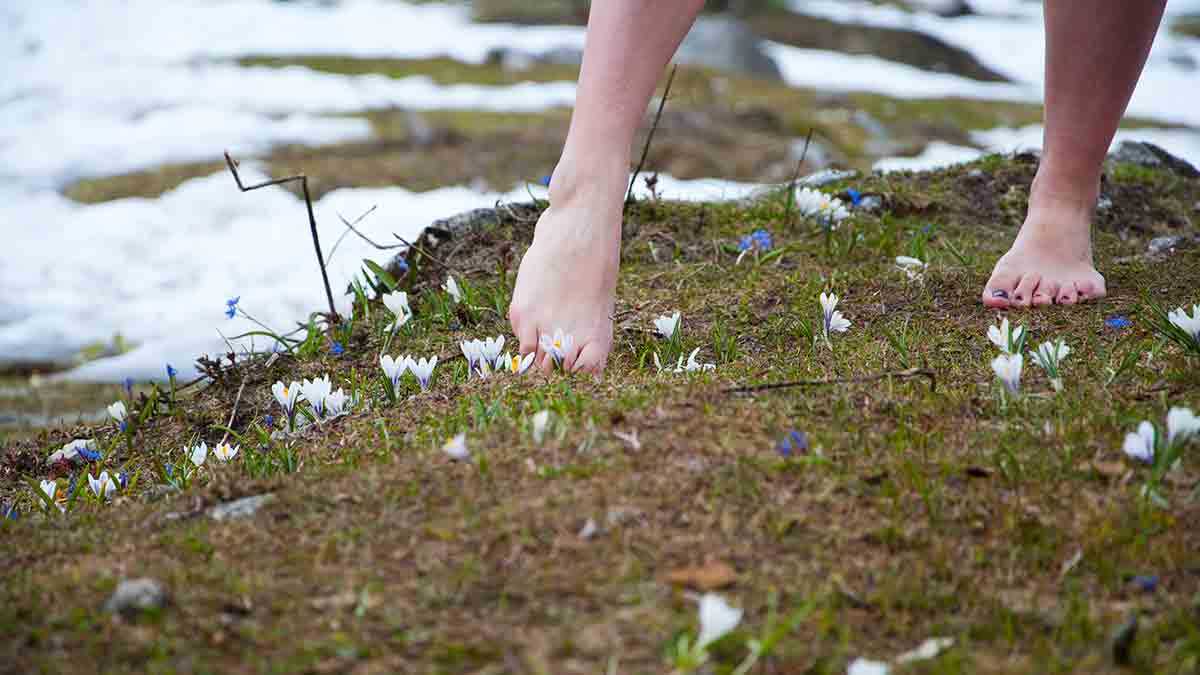
Effects and health benefits of walking barefoot:
- treats sleep disorders, including sleep apnea,
- relieves chronic pain
- reduces arthritis pain
- relieves the symptoms of PMS,
- reduces stress
- improves the immune system and reactions,
- increases energy reserves,
- reduces glucose fluctuations in people with diabetes,
- liquefies the blood.
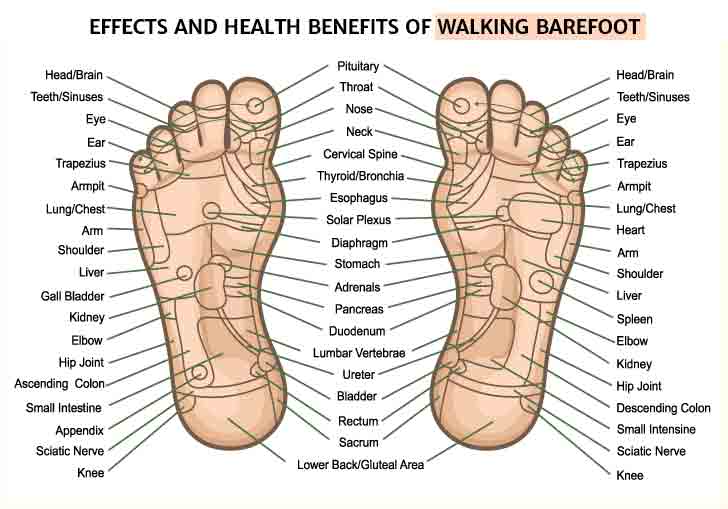
There are several ways to get free electrons:
Practice barefoot “sessions” whenever the weather allows.
- Take off your shoes, socks, and go barefoot through the grass, dirt, sand – anywhere, anywhere on earth.
- Studies show that it reduces pain and stress if you do it daily for 30 to 80 minutes.
- It is best to walk on the dewy grass because water is a better conductor.
- You won’t do it in the winter or in an absolutely urbanized place. Therefore, it is possible to have a container full of earth on which you can stand for about 20 minutes.
- You can soak your feet in a solution of sea salt.
Various natural surfaces are suitable for walking barefoot: grass, soft sand, gravel, pebbles, needles, even mud, and the like.
Especially important to walk barefoot on the sand and pebbles of the seaside.
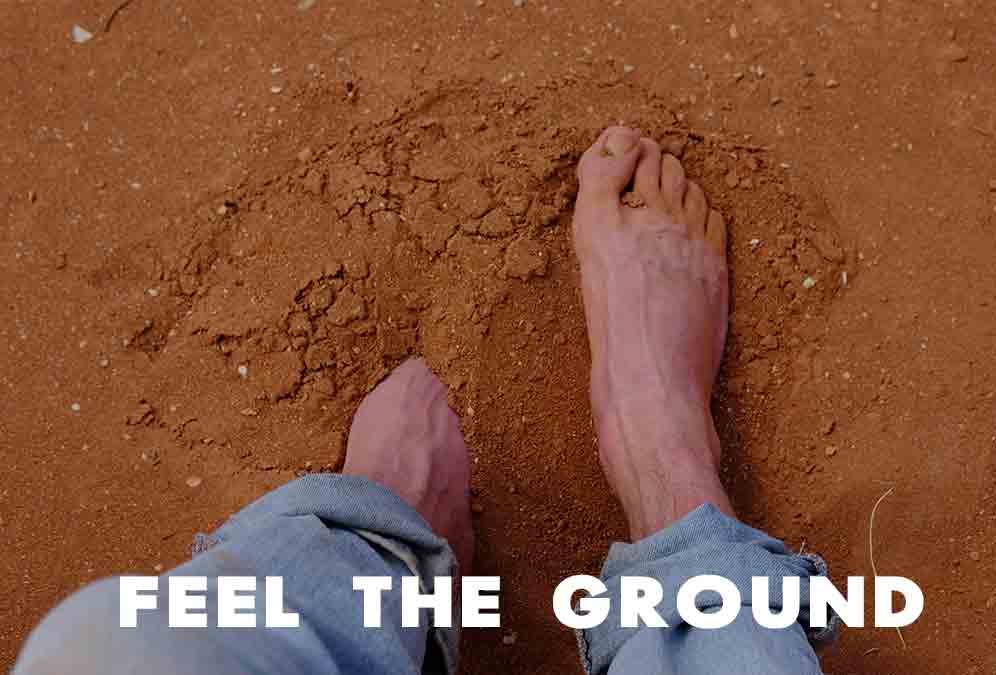
Often on the seaside, you have to see people walking along the shore with shoes and so you want to say take the opportunity, take it off and give your feet a, great massage.
After all, the seaside has very good climatic conditions: coolness, clean sand, small pebbles tone the venous plexuses of the soles, and protect against tiring swelling of the feet.
Artificial surfaces are not suitable for walking barefoot: asphalt, concrete pavement, pads, and the like.
Of course, if we go through such a cover for a short time, nothing will happen, but if we walk on it barefoot all day, we can do more harm than good, as both foot pain and scabies can occur.
But walking barefoot may not be appropriate for some.
There are conditions in patients where reflexology (foot stimulation) should be avoided, leading to unwanted side effects.
During pregnancy (first trimester), it is not recommended with digestive problems such as diarrhea or vomiting, with local foot damage, with fever.
According to reflexology, the body system can be over-stimulated in such situations, and infections can even get worse.
Even when walking barefoot on the sand or grass of the seaside, you need to know and observe the area:
- There are no glass
- Beware of sharp metal objects
- Beware if you are walking under a freshly cut stubble
- Beware of a sharp pole if you are walking on a flowery meadow
Check this amazing video about walking barefoot.
Barefoot – on the balcony?
Not one of us has heard Sebastian Kneipp’s name. German clergyman S.Kneip 19th c. developed a holistic health improvement model that emphasized the importance of foot stimulation on different surfaces and temperatures.
In this respect, barefoot footpaths are based, and more and more places around the world have been installed recently and are attracting more and more curious people who want to try them out. When walking on different surfaces, one can feel different sensations after the other, thus stimulating different feet.
Combining barefoot walking on various irritating surfaces improves blood circulation, provides more energy and improves mood and work capacity. Simultaneously, it is a very effective means of hardening the body, which benefits a person of any age.
As you walk through the larger stones, you feel cool, and your feet are easily stimulated by encircling each stone.
In the pine cone section, the legs have to adapt to the unevenness, so you have to develop balance, and the feet are already more actively stimulated from the touch of the spikes. After this stretch, it is soothing to walk on the sand, and in the other stretch, you have to ride from one wooden roller to another, which massages the feet in the rough bark, and these have to adapt to the convex surface.
Of course, summer is the best time to try barefoot walking, and there are more benefits to living in your own home, having homesteads, or other opportunities whenever you want to escape to the yard. There is a way out for others. It is possible to create a small barefoot area just on the balcony.
When you go to nature, gather small and large stones, pine cones, sand, gravel, spikes, twigs, pour them into separate containers, even empty cardboard boxes, and here is your personal barefoot footpath. Stand on these surfaces regularly at least once a day, press them with your feet and take the time to listen to your body.
It will definitely thank you.
